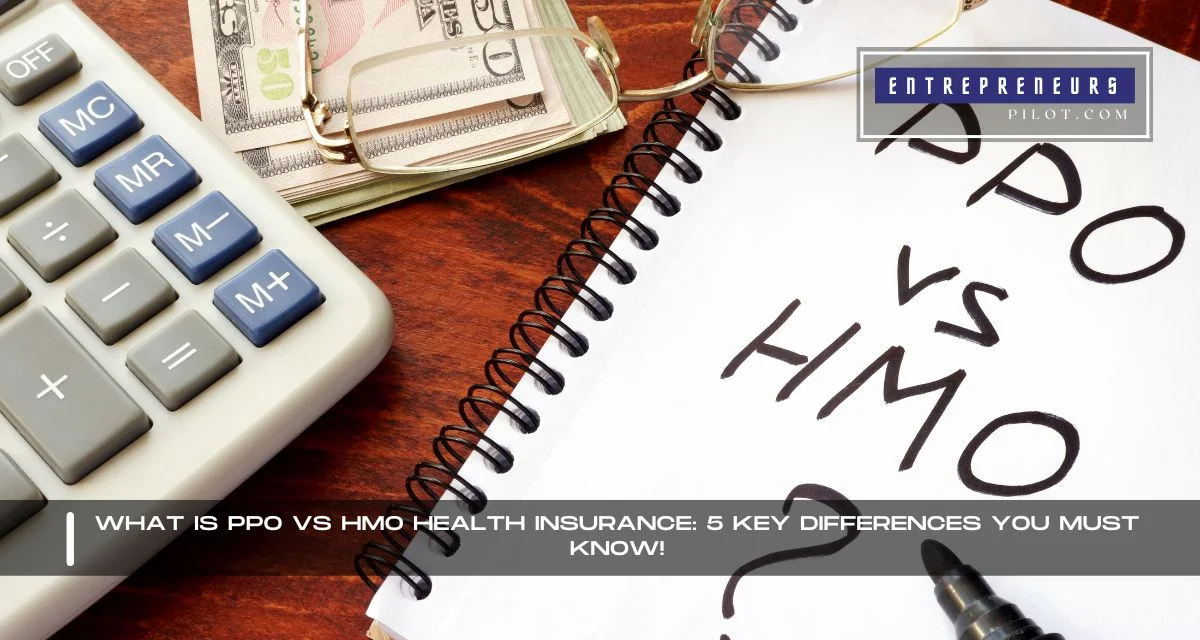Introduction
Navigating the maze of health insurance options can often feel like deciphering an ancient code. Among the various plans available, two stand out prominently: PPO and HMO. Understanding “What Is PPO Vs HMO Health Insurance” is crucial for anyone looking to make an informed decision about their healthcare coverage. These two types of plans differ significantly in structure, flexibility, and cost, impacting your healthcare journey. With 5 key differences that you must know, this guide aims to shed light on the PPO and HMO puzzle, helping you decide which plan aligns best with your health needs and lifestyle. Let’s dive into the essentials of PPO vs. HMO health insurance, ensuring you’re equipped to make the right choice for your well-being.
Table of Contents
What Is PPO Vs HMO Health Insurance: Understanding the Basics
Network Flexibility
One of the most significant differences between PPO (Preferred Provider Organization) and HMO (Health Maintenance Organization) plans lies in network flexibility. PPOs offer a broader choice of healthcare providers, allowing you to see specialists and doctors outside of your network without needing a referral. This flexibility is ideal for those who value freedom in managing their healthcare or who frequently travel. On the other hand, HMOs require you to choose a primary care physician (PCP) within a specified network, and referrals are needed to see specialists, making it a more structured and potentially limiting option.
- For Expert Financial Insights And Guidance, You Can Visit Our Sister Site – ArabsGeek.com Now!
- Curiosity Piqued? Dive Into the Most Captivating Financial Content by Visiting Our Homepage!
- Unlock Exclusive Business Opportunities! 🚀 Connect with Us Now at our Email: [email protected]!
Out-of-Pocket Costs
When it comes to “What Is PPO Vs HMO Health Insurance,” cost considerations are paramount. PPO plans typically come with higher premiums and out-of-pocket costs, including deductibles and copays, in exchange for their flexibility. Conversely, HMO plans are generally more budget-friendly with lower monthly premiums and minimal copays. However, the trade-off is less flexibility and the requirement to stay within the network for the lowest costs. Understanding your financial situation and healthcare needs is crucial in determining which plan makes the most sense for you financially.
Referral Requirements
The need for referrals is a standout feature distinguishing PPOs from HMOs. With an HMO, your primary care physician acts as a gatekeeper to specialists and additional services, requiring referrals for most types of specialist care. This structure aims to ensure that all care is necessary and coordinated efficiently. In contrast, PPO plans do not require referrals, granting you the autonomy to see specialists directly. This difference is critical for those who prioritize direct access to a wide range of specialists without the extra step of consulting a PCP.
Coverage for Out-of-Network Care
PPO plans shine in offering partial or full coverage for out-of-network care, albeit often at a higher cost than in-network services. This feature is particularly valuable for those who have established relationships with providers outside of the plan’s network or need specialized care unavailable within the network. HMO plans, however, typically do not cover out-of-network care except in emergencies, making it essential to be comfortable with the network’s providers and facilities.
Preventive and Wellness Care
Both PPO and HMO plans emphasize preventive and wellness care, but their approaches can differ. HMOs often include comprehensive preventive care at little to no cost to encourage regular check-ups and early detection of health issues. PPOs also cover preventive services, but the focus on network flexibility might lead to variations in how easily these services are accessed and utilized.
Conclusion
Deciphering “What Is PPO Vs HMO Health Insurance” is a crucial step toward securing the healthcare coverage that best suits your needs. From network flexibility and out-of-pocket costs to referral requirements, coverage for out-of-network care, and preventive care approaches, the differences between PPOs and HMOs are clear. By understanding these key aspects, you can make an informed decision that aligns with your healthcare priorities, lifestyle, and budget. Remember, the right choice varies from person to person; what matters most is finding the plan that offers you peace of mind and supports your health journey.
Frequently Asked Questions
1. Can I switch from an HMO to a PPO plan if my healthcare needs change?
Yes, you can switch from an HMO to a PPO plan during the open enrollment period or after experiencing a qualifying life event that triggers a special enrollment period, such as marriage, childbirth, or loss of other coverage.
2. Are prescription drugs covered differently in PPO and HMO plans?
Prescription drug coverage can vary between PPO and HMO plans. Both types of plans typically offer prescription drug coverage, but the formulary (list of covered drugs) and copays may differ. It’s essential to review the drug coverage details of any plan you consider.
3. How do I know if my current doctors are in the network for a new PPO or HMO plan?
You can check if your current healthcare providers are in-network by visiting the insurance plan’s website and using their provider search tool or by directly contacting your doctors’ offices to ask if they accept the new insurance plan.
4. Do PPO plans always have higher premiums than HMO plans?
While PPO plans typically have higher premiums than HMO plans due to their increased flexibility and coverage options, this is not a universal rule. Factors such as the insurance provider, geographic location, and specific plan features can affect premium costs.
5. Is emergency care covered differently in PPO and HMO plans?
Both PPO and HMO plans are required to cover emergency care, even if the provider is out-of-network. However, the definition of “emergency” and the associated costs can vary, so it’s important to understand how your plan handles emergency care.











